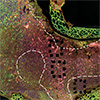| Mar 21, 2023 |
|
(Nanowerk News) Glucose-responsive insulin that eliminates the need for people with type 1 diabetes to check their blood sugar levels could be a step closer thanks to research led by RMIT and Monash University.
|
|
Published in Advanced Materials (“An engineered nanosugar enables rapid and sustained glucose-responsive insulin delivery in Diabetic mice”), the preclinical study features an artificial pancreas system that can release insulin precisely and smartly only when the body actually needs it, making control of blood glucose more reliable.
|
|
First authors Dr Sukhvir Kaur Bhangu (RMIT and University of Melbourne) and Dr Rong Xu (Monash Universit) said if it worked in humans, only two injections would be needed per day.
|
 |
| Dr Sukhvir Kaur Bhangu and Dr Francesca Cavalieri in the microscopy labs at RMIT. Dr Sukhvir Kaur Bhangu and Dr Francesca Cavalieri in the microscopy labs at RMIT. (Image: RMIT University)
|
|
Current insulin therapy requires people to monitor their blood sugar throughout the day and take multiple, carefully calculated doses based on food intake, exercise, stress, illness and other factors.
|
|
Some must inject themselves up to five times a day.
|
|
Continuous glucose monitoring devices remove, or at least reduce, the need for finger pricks, and insulin pumps can automatically deliver insulin, but they’re expensive and not always able to calculate the correct amount of insulin to be given.
|
|
This new system developed through collaboration by RMIT, Monash, University of Melbourne and the Baker Institute addresses these issues by responding directly to glucose levels in the blood, which current insulin does not.
|
|
The multidisciplinary team’s ‘artificial pancreas system’ uses phytoglycogen nanoparticles to deliver and release insulin in response to glucose levels in the blood.
|
|
This engineered nanosugar platform enables rapid and sustained glucose-responsive insulin delivery, in a way that is longer lasting and smarter than other systems.
|
|
Xu said it required only one injection every 12 hours and self-regulated.
|
|
“This system would mean fewer injections and, potentially, no need to measure glucose,” Xu said.
|
|
The discovery has also led to a joint patent filed by RMIT, Monash and Melbourne universities.
|
|
The research emerged from an NHMRC Ideas Grant awarded to co-lead authors RMIT Associate Professor Francesca Cavalieri and Monash University’s Professor Christoph Hagemeyer, and co-author Professor Frank Caruso at the University of Melbourne to develop this revolutionary type of insulin.
|
|
While more research is needed, the results are promising.
|
|
Cavalieri said the research team, which includes several clinicians, now hopes to secure funding to continue the project and eventually undertake clinical trials.
|
|
“This new method is not only efficient, it’s biodegradable and uses natural methods, which significantly reduces the chances of adverse affects or immune reactions,” she said.
|


